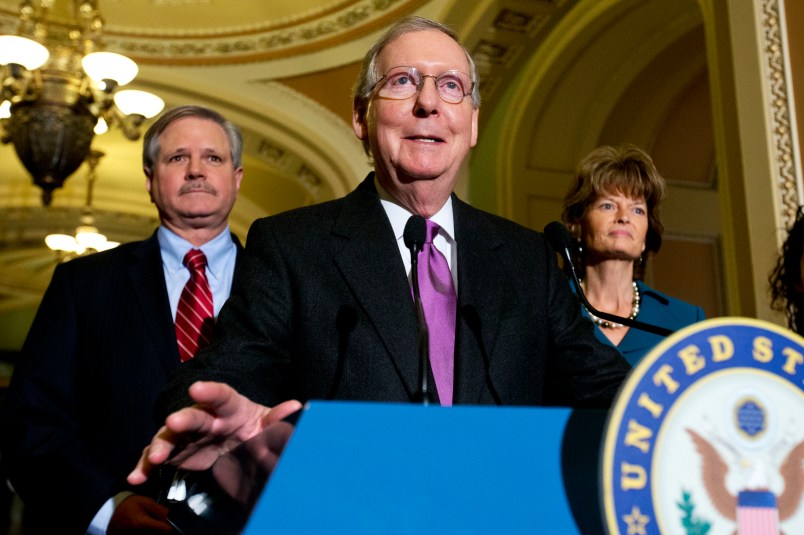WASHINGTON — Before he became majority leader, Sen. Mitch McConnell (R-KY) promised to use the power of the purse to rein in President Barack Obama.
Now McConnell’s strategy is facing its first critical test, and it’s failing.
Last week the Republican-led Senate voted three times in three days to move legislation to fund the Department of Homeland Security with provisions overturning Obama’s executive actions to protect millions from deportation. All three times, Democrats united to filibuster it, stopping it dead in its tracks, and leaving Republicans empty-handed.
The conundrum was somewhat predictable. McConnell had relinquished his only surefire leverage — to withhold funds to keep the government running — by promising there was “no possibility of a government shutdown” on his watch.
Without the threat of a shutdown, Democrats had little incentive to play ball, and Obama had no reason not to veto a bill that undermined his major initiatives. Complicating matters further for McConnell, Democrats are steeled by the recognition that voters typically blame the party that controls Congress, not the White House, for a government shutdown. And so Democrats didn’t hesitate to filibuster the bill, and the president has been unwavering in his refusal to sign anything that irreparably harms his signature initiatives.
McConnell was flummoxed by Democrats’ blocking tactics.
“I think it’s a rather, honestly, absurd position to say that, ‘We object to the bill but we don’t want to debate the bill or change the bill.’ So, I’m perplexed,” he said, responding to a question from TPM. “I think it’s a pretty hard argument to make with a straight face.”
After the Thursday vote, McConnell adjourned the Senate for the week without a fallback plan as the clock ticks to a DHS shutdown on February 27.
Multiple Republican senators who spoke to TPM to last week — including Sens. John McCain (R-AZ), Roger Wicker (R-MS) and Jeff Flake (R-AZ) — said they didn’t know what the Senate would do next on DHS funding.
“You’ll have to ask the leader,” Missouri Sen. Roy Blunt, the vice chair of the Senate Republican Conference, told TPM on Thursday.
Meanwhile, House Republicans have no intention of bringing up a “clean” DHS bill to bail out McConnell. Such a proposal would likely lose the support of a large majority of the House GOP, making it extremely difficult for Speaker John Boehner (R-OH), who clung to his post last month amidst record defections by his members.
In the future, McConnell may have better luck extracting concessions on less contentious matters where the White House is willing to compromise. (For instance, the bill enacted in December to keep most of the government running through September 2015 included provisions to eliminate regulations on Wall Street and campaign finance.) That has been the dynamic since Republicans took over the House in 2011. McConnell’s ascent to majority leader beefs up that leverage marginally, but only on matters where the White House won’t draw a red line.







Huh. It turns out that McConnell and the GOP really aren’t good at governing. And this is news, because…?
" “I think it’s a rather, honestly, absurd position to say that, ‘We object to the bill but we don’t want to debate the bill or change the bill.’ So, I’m perplexed,” he said, responding to a question from TPM. “I think it’s a pretty hard argument to make with a straight face.” "
He said that with a straight face?
He is certainly missing his irony sensor.
Soon he gets rid of the filibuster altogether and heads back into the minority where he stays a long, long time.
9 Cubans just landed in Miami off the Beach.
QUICK - Someone ask Marco Rubio why they get to stay but no one else does and why he’s trying to prevent immigration reform along with his boys in the Senate.